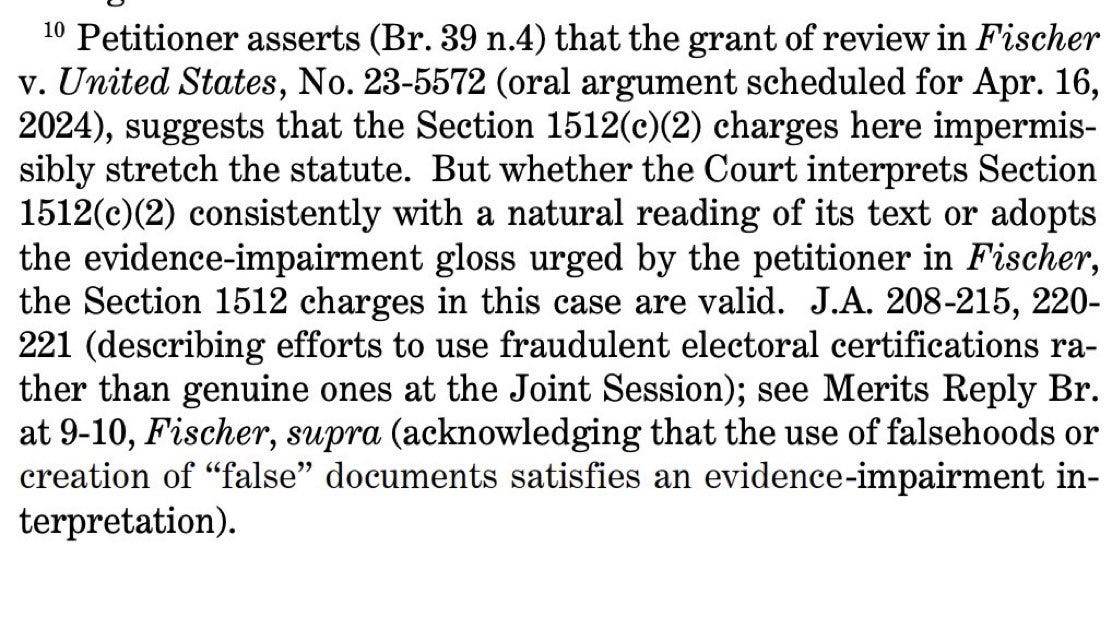In a normal world, we’d all be talking about a pair of big oral arguments at the Supreme Court this week. But obviously, we live in a world that is anything but normal. To discuss this week’s cases at the Supreme Court, we have to take a break from the criminal prosecution of the former president. I’m still struck, every time I say or write that, how important it is that we not become immune to that fact. Donald Trump is not the victim of a witch hunt or of any political persecution. He is a four-times indicted, twice impeached, lifetime fraudster who bamboozled far too many Americans in order to win the presidency. It’s our job to make sure he doesn’t return to it. Both of the Supreme Court cases we take a look at tonight have an angle that involves public corruption, so it’s important to make time for them.
If you need a quick moment of normalcy before we get there, we’re in the halcyon days of Spring down in the Deep South, the couple of weeks where everything is in bloom and hasn’t yet become crazy hot and humid. I wish I could also send the delicious smell of the roses, but you’ll have to imagine that part.
It is an especially good time of year to be a chicken!
And also for the newest member of our family, Tofu the Maine Coon Cat.
With that, we’re off to the Supreme Court.
Snyder v. U.S.
When you think about a bribe, the classic example is the bad guy handing a politician bags of money, after which the politician does the bad thing requested of him. But what happens when the politician does the bad thing and then gets the bag of cash, a gratuity as it were? That’s the question posed by Snyder.
The issue the Supreme Court agreed to hear was “Whether section 18 U.S.C. § 666(a)(1)(B) criminalizes gratuities, i.e., payments in recognition of actions a state or local official has already taken or committed to take, without any quid pro quo agreement to take those actions.” Prosecutors argue that the statute means that both bribes and gratuities are prohibited. That seems like common sense. The concern is that the Court may have taken the case to legalize gratuities, permitting politicians to be rewarded after the fact for taking official action. Would the Court actually permit politicians to receive a reward, so long as it’s after the fact and on the basis of a nudge and a wink instead of a firm handshake deal with cash upfront? Taking this case feels like a bad look for a Court in the middle of its own ethics drama. But that did not stop them.
The statute in this case, 18 U.S.C. § 666(a)(1)(B), makes it a federal crime for a state or local official to “corruptly solicit[,] demand[,] ... or accept[] ... anything of value from any person, intending to be influenced or rewarded in connection with any ‘government business’ involving any thing of value of $5,000 or more.” This law relates to state and local corruption. Congress passed it to prevent the billions of dollars in federal funds that are distributed to states and localities every year from being pocketed by corrupt officials doing favors for their “friends.” The circuit courts are split on the gratuity question. Of the seven circuits that have weighed in, only the First and the Fifth Circuits have held that gratuities are okay.
Here is the outline of the defendant’s argument. James Snyder is the former mayor of Portage, Indiana. He was convicted of federal funds bribery in violation of 18 U.S.C. § 666(a)(1)(B) for soliciting and accepting $13,000 in connection with the city’s purchases of garbage trucks, as well as on other federal charges. He argued that there wasn’t an agreement to exchange money for the truck contracts before they were awarded, and that without that, he can’t be guilty of violating § 666.
The Court has narrowed the scope of conduct prosecutors can indict under the umbrella of “corruption” over time, expressing concerns that this and related laws like the bribery statute and fraud provisions don’t put public servant-defendants sufficiently on notice of what constitutes criminal conduct so they can avoid committing it. In Snyder, it may be that the Court is more interested in finally landing on a definition of corruption than it is on the specifics of this case, itself. Justice Alito noted, “We didn’t really take this case just to decide whether this particular case was correctly decided. We took it to explore the meaning of this provision.”
Justice Thomas was not present for Monday’s argument and no reason was given. In the past when Justices, including Thomas, have been absent because of illness, that has been mentioned. The Chief Justice indicated Justice Thomas would participate in the decision, having read the briefs and being able to listen to tapes of the argument. He returned to Court on Tuesday for our next case. Mysterious.
Fischer v. U.S.
The issue in Fischer is whether the statute that prohibits obstruction of an official proceeding sweeps broadly to capture all kinds of conduct or whether it’s limited to alteration/destruction of documents. 18 U.S.C. § 1512(c)(2) is the most serious charge brought against around 350 of the January 6 riotors. That section of the code is titled “Tampering with a witness, victim, or an informant” and subsection c sets forth two crimes:
Subsection (c)(1) is explicitly about altering, destroying, etc., documents or other objects to prevent them from being used in an official proceeding. Subsection (c)(2) prohibits “otherwise” obstructing, etc., “any official proceeding” or attempting to do so. The defendants want §§ 2 restricted to documents. The government argues that it is a catchall provision meant to capture all conduct designed to obstruct official proceedings, no matter what form it takes.
The provision was passed by Congress as part of the Sarbanes-Oxley Act in 2002 following the Enron scandal. Enron executives committed massive business fraud, manipulating their books by hiding debts and inflating assets, and went to prison for it. But the Supreme Court reversed the conviction of their auditors, Arthur Andersen, who destroyed documents that were relevant to the Enron investigation, because of a loophole in the then-existing provisions of 18 U.S.C § 1512. The subsection Fischer is charged under was meant to fix that problem. His lawyers argue that the government’s interpretation is overly broad and the statute is only meant to cover documents cases. The Solicitor General argued in her brief that, “Congress further enacted 18 U.S.C. 1512(c)(2) to address the larger problem the Enron scandal brought to light—namely, the risk that corrupt obstruction could occur in unanticipated ways not prohibited by statutes targeted at specific forms of obstruction.” She told the Court in both her briefs and in oral argument that the language of the statute plainly criminalized any conduct that “otherwise obstructs” an official proceeding, so long as it is done with a “corrupt” state of mind—the other requirement in the statute.
Mr. Fischer is one of hundreds of January 6 defendants charged under this statute. Ahead of January 6 he wrote about his desire to take Democratic members of Congress “to the gallows.” A police officer, he texted in mid-December, “Can’t vote if they can’t breathe..lol.” If the government loses in Fischer, it could mean that all similarly charged defendants’ convictions get overturned.
Donald Trump is also charged with violating this statute in Jack Smith’s election interference case. It is the charge in counts two and three, one alleging conspiracy to violate the statute in connection with the Electoral College vote certification and the other alleging a substantive count of violating the statute. But, a loss for the government in Fischer may not get Trump off the hook. That’s because Jack Smith anticipated this possibility and offered a theory that would save his counts, arguing that even the most limited interpretation of the statute urged by the defendants, restricting it to obstructing an official proceeding by monkeying with documents, would incorporate Trump’s conduct. They argued that Trump’s conduct involves the creation of false documents to interfere with certification of the Electoral College vote.
Despite the Solicitor General’s main argument in Fischer, that “otherwise obstructs” means just what it says and applies to the January 6 cases, the supposed textualists on the Supreme Court seem willing to abandon the text here. The government’s argument is supported by a plain reading of the language of the law, but the general assessment afterward was that a majority of the Justices were not in her camp. Even Justice Jackson said that when it passed § 1512(c), Congress wasn’t “writing on a blank slate,” and was focused on destruction of evidence. She seemed to reject the argument that §§ (c)(2) was an effort to “learn the lesson of Enron,” which the Solicitor General said was Congress’s new understanding that when they tried to list all of the ways to obstruct an official proceeding in the statute, something they hadn’t thought of would “sneak through,” so they intended to write a broad omnibus provision, as evidenced by the language they used here.
The trial judge in Fischer’s case dismissed the obstruction charge. But the Court of Appeals reversed him, writing that the “meaning of the statute is unambiguous”: It “applies to all forms of corrupt obstruction of an official proceeding, other than the conduct that is already covered by” the prior subsection. Now the fate of Mr. Fischer and others is in the hands of the nine justices.
All of this is prelude to next week’s argument of the immunity appeal, where Trump argues that no matter how horrible everything he did to interfere with the 2020 election was he cannot be prosecuted for it because . . . if you’re the president, they let you do it. Will be wild.
We’re in this together,
Joyce










Thanks for the beauty and humor along with your expertise to help us be informed citizens and do what must be done to fend off fascism.
"Donald Trump is not the victim of a witch hunt or of any political persecution. He is a four-times indicted, twice impeached, lifetime fraudster who bamboozled far too many Americans in order to win the presidency. It’s our job to make sure he doesn’t return to it." Great summary!
My guess in the 1512 case before SCOTUS is: 7/2 to set aside the convictions on that statute. Disgraceful and absurd, but SCOTUS is now a joke comprised of corrupt justices (Thomas and Alito), or liars (Beer Boy, Gorsuch and the Hand Maiden). Former Chief Justice is as much in charge of the court as Mr Magoo was in control of his Model T.